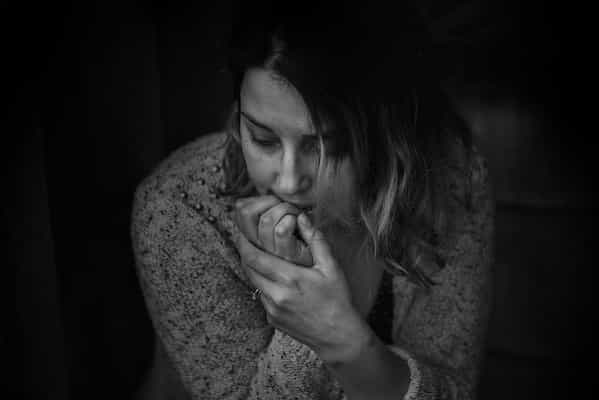Anxiety: Symptoms, Causes, & Treatment
Anxiety: Symptoms, Causes, & Treatment
 Anxiety is an emotional response of your body to stress. It is the fear of what’s going to happen next. For instance, attending an interview or first day of college may cause nervousness for some people.
Anxiety is an emotional response of your body to stress. It is the fear of what’s going to happen next. For instance, attending an interview or first day of college may cause nervousness for some people.
Feeling nervous is nothing to worry about. It happens for most people when they encounter new things or challenges. However, if your fear lasts for weeks and months, and interferes with your daily life, it is time to give it a serious thought.
What is anxiety disorder?
Simply put, anxiety disorder is a medical condition with extreme fear, nervousness, worry and apprehension. Women are more prone to anxiety disorder. However, it can affect anyone regardless of their gender or age.
If you are feeling scared for an extended period of time or your fear is not going away even after making the best efforts, we recommend you seek help from a therapist specialized in the treatment of anxiety.
What are the symptoms of anxiety?
 Anxiety is a complex medical condition and not everyone suffering from the disorder feels it the same way. While some may experience a racing heart, several others might feel they’ve lost connection between their mind and body. If proper medical attention is not given, things may get out of control. Panic attacks, nightmares and/or fear about a person/place/event are also kinds of anxiety people experience.
Anxiety is a complex medical condition and not everyone suffering from the disorder feels it the same way. While some may experience a racing heart, several others might feel they’ve lost connection between their mind and body. If proper medical attention is not given, things may get out of control. Panic attacks, nightmares and/or fear about a person/place/event are also kinds of anxiety people experience.
The symptoms of anxiety disorder are:
- Enhanced heart rate
- Restlessness
- Increased irritability
- Difficulty focusing
- Trouble falling asleep
- Changes in blood pressure
- Rapid breathing
- Worrying all the time, often intrusive concerns
You are going through an anxiety attack if you experience:
- Dizziness
- Dry mouth
- Sweating
- Shortness of breath
- Hot flashes
- Distress
- Numbness/tingling
People experience these symptoms in their daily life, but if your fear is extreme and disrupting everyday living, it may be time to seek professional help.
What are the causes of anxiety?
Research is still being carried out to determine the cause of anxiety. Often, the condition is caused by multiple factors, such as:
- Environmental stressors: Problems at work, relationship issues, problems in the family
- Genetics: You are vulnerable to anxiety disorder if the condition is in your family history
- Medical factors: Anxiety may be the symptom of a different disorder/illness or the side effect of certain medications. The condition might also be caused by the stress of a surgery.
- Brain chemistry: Anxiety may also be the outcome of a misalignment of the brain’s electric signals and hormones.
What are the types of anxiety disorders?
- Panic disorder: Experience frequent panic attacks, unexpectedly. Often, a person with this disorder lives in constant fear of the next attack.
- Phobia: Fear of an event/object/situation.
- Social anxiety disorder: Fear of social situations and constantly worrying about your social groups judging you.
- Separation anxiety disorder: Worrying over getting separated from your loved ones.
- Illness anxiety disorder: Worrying about your health.
- Post-traumatic stress disorder: Stress experienced after a traumatic event.
 Can anxiety be diagnosed?
Can anxiety be diagnosed?
- There is no single test that can diagnose anxiety. The diagnosis involves a series of physical examinations and mental health evaluations.
- Your doctor asks you to get a report of your physical condition to rule out any possibility of underlying health issues that are causing these symptoms. If your case is extreme, an anxiety therapist uses scales and tests to determine your anxiety levels and provide treatment accordingly.
Treatment for anxiety
If your fear is mild and you think you can cope without clinical attention, try bringing in some lifestyle changes to suppress the symptoms. However, if your anxiety is persistent, do not hesitate to consult an expert anxiety care professional.
Anxiety treatment involves psychotherapy and medication.
- Psychotherapy involves meeting a therapist and learning the strategies to cope with the attack when it occurs.
- Medication involves the use of sedatives and antidepressants that work to reduce/eliminate the symptoms of anxiety disorder.
 Natural remedies for anxiety
Natural remedies for anxiety
- Get at least 7-8 hours of sleep/day
- Exercise regularly and stay active
- Eat a healthy diet
- Avoid caffeine, alcohol
- Quit smoking
Learn to manage stress. Instead of fearing deadlines and upcoming stressful events, try to plan and organize to simplify tasks. Take breaks and stay calm.
Deep breathing and relaxation can help you soothe your body and mind. Sit in a dark room and feel your inner self. The result will be positive.
Think positive and assure yourself you can get rid of the negative thoughts. It might be hard initially, but as you practice, things should improve.
Seeking professional help
It is easy to find and schedule an appointment with one of our therapists specialized in the treatment of anxiety in Denver and nearby cities. Our online scheduling system is available 24/7 or you may call our receptionist Monday through Friday 8:30am-5pm at 303-986-4197.
